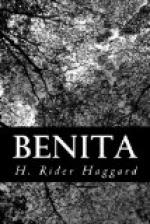Taking one of the tent ropes and the lantern, for her father still slept heavily, she went down to the entrance of the cave, and at the end of the last zigzag where once a door had been, managed to make it fast to a stone hinge about eighteen inches above the floor, and on the other side to an eye opposite that was cut in the solid rock to receive a bolt of wood or iron. Meyer, she knew, had no lamps or oil, only matches and perhaps a few candles. Therefore if he tried to enter the cave it was probable that he would trip over the rope and thus give them warning. Then she went back, washed her face and hands with some water that they had drawn on the previous night to satisfy their thirst, and tidied herself as best she could. This done, as her father still slept, she filled the lamps, lit one of them, and looked about her, for she was loth to wake him.
Truly it was an awful place in which to dwell. There above them towered the great white crucifix; there in the corner were piled the remains of the Portuguese. A skull with long hair still hanging to it grinned at her, a withered hand was thrust forward as though to clutch her. Oh, no wonder that in such a spot Jacob Meyer had seen ghosts! In front, too, was the yawning grave where they had found the monk; indeed, his bones wrapped in dark robes still lay within, for Jacob had tumbled them back again. Then beyond and all around deep, dark, and utter silence.
At last her father woke, and glad enough was she of his human company. They breakfasted upon some biscuits and water, and afterwards, while Mr. Clifford watched near the entrance with his rifle, Benita set to work to arrange their belongings. The tent she managed to prop up against the wall of the cave by help of some of the wood which they had carried in. Beneath it she spread their blankets, that it might serve as a sleeping place for them both, and outside placed the food and other things.
While she was thus engaged she heard a sound at the mouth of the cave—Jacob Meyer was entering and had fallen over her rope. Down it she ran, lantern in hand, to her father, who, with his rifle raised, was shouting:
“If you come in here, I put a bullet through you!”
Then came the answer in Jacob’s voice, which rang hollow in that vaulted place:
“I do not want to come in; I shall wait for you to come out. You cannot live long in there; the horror of the dark will kill you. I have only to sit in the sunlight and wait.”
Then he laughed, and they heard the sound of his footsteps retreating down the passage.
“What are we to do?” asked Mr. Clifford despairingly. “We cannot live without light, and if we have light he will certainly creep to the entrance and shoot us. He is quite mad now; I am sure of it from his voice.”
Benita thought a minute, then she answered:
“We must build up the passage. Look,” and she pointed to the lumps of rock that the explosion of their mine had shaken down from the roof, and the slabs of cement that they had broken from the floor with the crowbar. “At once, at once,” she went on; “he will not come back for some hours, probably not till night.”




